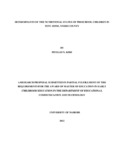| dc.description.abstract | This study aimed at assessing the determinants of nutritional status of pre-school children in Tetu Zone, Nyeri County, Kenya. The study sought to establish effect of maternal education on nutritional status of preschool children, determine the impact of household economic status on nutritional status of preschool children, find out the impact of quantity of food on nutritional status of preschool children and to investigate the effect of quality food on nutritional status on preschool children. It is hoped that the findings of the study may enable the stakeholders realize the importance of determinants of nutritional status to preschools.
The findings of the study may also form a basis for further research on impact of determinants on nutritional status of preschool children. Also stakeholders such as teachers, parents and caretakers may be sensitized on the determinants of nutritional status on their children. The study adopted a descriptive research design. The target population was preschoolers, teachers and parents. This involved 4 private and 6 public schools, giving a total of 800 children. Stratified sampling method was used in selecting schools to be included in the sample. The schools will be categorized into two; private and public. A half from each of the two categories of schools was picked at random to give a total of 5 schools in the sample. From the five schools, samples of 50 children were randomly sampled from the attendance registers of each school. Three research instruments were used.
There were two researcher administered questionnaires, one for the parents and another for the teachers. One semi structured interview schedule was used to collect data from children. The researcher administered the questionnaires to the parents and the teachers as well as the semi-structured interview schedule to the children to collect data. The data was coded, entered and analyzed using the Statistical Package for Social Sciences (SPSS program). Descriptive statistics such as percentages, means and frequencies will be used to describe the population characteristics such as the demography, income, occupation and the education of the parents. Statistical analysis used included Pearson correlation. Correlation coefficient was used to analyze the magnitude of the maternal education, house hold economic status, quality and quantity of food and nutritional status of the pre-school children.
The study found that nutrition status of children is determined by several factors. First, the correlations between maternal education and nutrition status of children obtained was positive and significant, r (0.38) implying that there-is-a significant positive correlation between maternal education and the nutrition status of the children. The coefficient of determination (r2) is found to be 0.14 meaning that maternal education contributes 14.3% to the children's nutritional status of the children.
Secondly, it was found out that the correlation coefficient between the family economic status and nutritional status of children as indicated by the mid upper arm circumference zone of the child was significant and positive(r=0.178). Showing that family income impacts significantly on the nutrition status of the children. The coefficient of determination (r2) value was 0.032 indicating that the monthly income of the family accounts 3.2% of the nutrition status of the child. Thirdly, the findings of the study revealed that the multiple correlations between the type of food taken and the nutrition status of children are positive and significant. This implies that the quality of food taken determines the nutrition status of the children. Finally, all the correlations between the amount of food taken and the nutritional status of children were positive and significant. This implies that the amount of food is a determinant of the nutritional status of children. | en_US |

